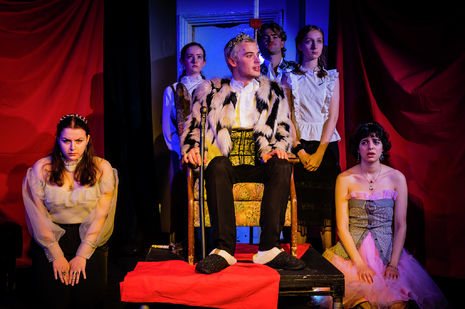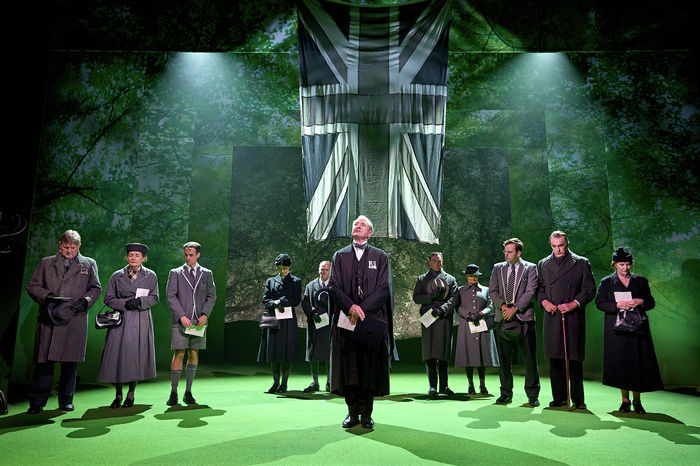Exit the King is no royal success
Beatrice Coulter laments a lack of emotion in this tale of a king’s decline

The plot of Exit the King revolves around the ever present prospect that King Bereger, whose empire has collapsed and whose first wife will not love him, will die at the end of the show. In stark contrast to most of Eugene Ionesco’s work about accumulation, Exit the King is about decline; the decline of civilization, of love, of man itself. Portraying this in a way in keeping with Ionesco’s script, as well as dramatic principles, will always be a challenge.
“Manages to accurately portray the emotional nuances [...] of a man who sees in his future nothing but eternal decline”
This is a challenge which the ensemble takes on whole-heartedly. They approach the material with the right level of being ‘in’ on the joke which Ionesco demands, while also providing the necessary sense that the world is indeed ending. Particular standouts include the titualar King Berenger (Hugo Gregg), Queen Marie (Lucia Guzy-Kirkden), and the Guard (Eddie Adams). Gregg is given a lot of material to chew through and manages to accurately portray the emotional nuances not just of a man knowing that he will die, but of a man who sees in his future nothing but eternal decline. Guzy-Kirkden and Adams provide the perfect mix of levity and sincerity to their roles, both expressing different reactions to the collapse of not only the king, but sanity itself.
But adaptations of Ionesco are as much sensory affairs, and in this respect, the show did not disappoint. The set grabs your attention from the moment you walk in. The plush red fabric with the elevation of the ‘throne’, contrasted with the battered chaise longue and armchair standing in for said ‘throne’, perfectly illustrates the themes of decline in the face of opulence. Likewise, Esme Bishop’s costumes were a highlight of the show. Accurately conveying the post-apocalyptic aesthetic, she still manages to illustrate not only the character’s themselves but the dynamics between them. In particular, the pink tulle dress for Queen Marie will live in my mind for a very long time. The lighting and sound design by Hillary Qiu and Matthew Mayes, is competently done and heightens the emotion of the script. The lighting at moments really enhances the existentialism at the heart of Gregg’s mental and physical decline. But to a large extent these are limited by the direction of the show.
“The show lacked an emotional gut punch”
Unfortunately, this is where the show hits a roadblock. Ionesco belongs to a group of playwrights like Artauld and Brecht, where a director can reject realism and really flex their creative and imaginative muscles, and this is an area where the play really falls flat. There were moments where you could feel real imagination coming through, such as one moment where the action on stage combines with the lighting and sound design to give the feeling of an arcade game.
But these moments were few and far between, particularly as the play goes on. As a result, long stretches of the play feel incredibly drawn out, with mostly inactive characters talking unbroken to each other about death. The energy of decline, a theme present in the play, is not felt on stage whatsoever. The earth falls apart, the crack gets wider, the nation gets surrounded by its enemies, yet it is hard to really tell that it is taking place. The decline of the nation alongside the decline of the king evokes little in the audience, with the king’s final moments leaving little emotional impact, in spite of Gregg’s incredible performance. It seems uncharacteristic given that Ionesco’s plays are all about emotion, yet the show lacked both an emotional gut punch and Ionesco’s maximalist absurdity. And it is not like that tone was out of reach.

A Voyage Round My Father goes nowhere
It’s not often in a review that the marketing of a show is mentioned, but it would be a mistake not to. The publicists (Amy Oh and George Jackson), knocked it out of the park in capturing the sheer maximalism and absurdity of what Ionesco can do. I would highly recommend watching the show’s trailer that was posted to their Instagram, which is in many ways the perfect distillation of what an Ionesco play should be.
But, regardless, there is a reason why we focus on the play performed, and it is at this where the play does not live up to its promise. Which is a shame, because in the Britain of 2023, there is real reason to revisit Ionesco’s classic play which puts decline at its centre. Yet, this production can’t quite seem to make the play its own and in doing so, ends up plodding along until the end.
 News / Colleges charge different rents for the same Castle Street accommodation2 March 2026
News / Colleges charge different rents for the same Castle Street accommodation2 March 2026 News / News in Brief: waterworks, wine woes, and workplace wins 1 March 2026
News / News in Brief: waterworks, wine woes, and workplace wins 1 March 2026 News / Climate activists protest for ‘ethical careers policy’1 March 2026
News / Climate activists protest for ‘ethical careers policy’1 March 2026 News / Angela Merkel among Cambridge honorary degree nominees27 February 2026
News / Angela Merkel among Cambridge honorary degree nominees27 February 2026 News / Private school teacher who lied about Cambridge degree barred from teaching27 February 2026
News / Private school teacher who lied about Cambridge degree barred from teaching27 February 2026









